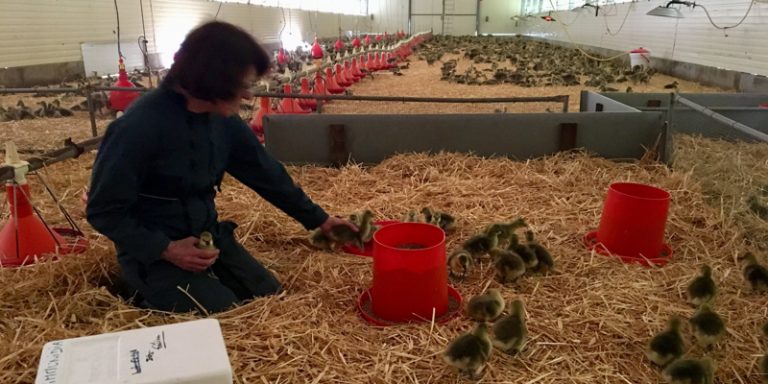
The start-up Aviwell specializes in hybrid artificial intelligence and biotechnical solutions that have enabled it to develop naturally fatty liver, i.e. without force-feeding. The start-up has chosen the Toulouse White Biotechnology (TWB) laboratory of the INRAE Occitanie-Toulouse centre to operate its exclusive AI-driven microbiome discovery platform. Its ambition is to significantly improve animal growth and health in an ethical, sustainable environment, and will be looking at other farm animals. Aviwell will therefore move into the new TWB premises.
Based in Toulouse (France) and Boston (USA), Aviwell is a start-up specializing in biotechnologies and hybrid artificial intelligence. It develops and experiments with unique biological algorithms and has developed a proprietary platform for the discovery of the microbiome (bacteria and micro-organisms).
Originally, it was Rémy Burcelin, research director at Inserm, who created the company Aviwell in 2015, in Pailhès. He explains:
“My work led me to study the role of certain intestinal bacteria in the control of fat storage in the liver. Quickly, a question sprang to mind: could the phenomenon concern the geese and ducks that we know well here in the South West?”
With the help of two colleagues, he set up an experimental farm and after two years of research and development, foie gras without force-feeding was a reality. The three founders of Aviwell decided to apply their technology to other agri-food markets: pig, chicken and even fish production. Mouli Ramani, CEO of Aviwell said:
“We have already successfully trialled our patented processes on geese with the aim of producing naturally fatty liver, and without resorting to force-feeding. Now we want to take it to the next level and apply the learnings from our microbiome discovery platform to other species such as chickens and pigs, which we consume on a much more regular basis than foie gras.”
Increasing feed efficiency
Aviwell has finalised its scientific approach to developing a multi-faceted, AI-driven microbiome discovery platform to discover and create more natural and healthy solutions. It uses proprietary data processing tools and algorithms to naturally identify and adapt the gut microbiota of farm animals.
Aviwell wants to tackle the major problem of our time: feeding nearly 8 billion people while natural resources are depleting, all countries are affected by food problems, whether it is under-nutrition or malnutrition. The company takes into account animal suffering and the problems caused by climate change, its objective is to improve the health of farm animals in a natural, sustainable and environmentally friendly way while meeting market requirements. Mouli Ramani, CEO of Aviwell states:
“Our goal, in the long run, is to revolutionize the agri-food sector in a natural, sustainable and environmentally friendly way for the sake of our planet.”
Rémi Burcelin states:
“It is possible, by using bacterial ferments that we develop, to significantly reduce the resources used in animal husbandry, be it food, inputs or water,” the executive assures. In this way we increase what is known as feed efficiency.”
Toulouse White Biotechnology, an ideal partner for Aviwel
The Toulouse White Biotechnology laboratory is part of the INRAE Occitanie-Toulouse centre. INRAE, the national research institute for agriculture, food and the environment, is the world’s leading research organization specializing in these three fields. Partner of 33 university sites, it participates in the dynamism of the national research and higher education ecosystem and employs 12,000 people throughout France. Its international network enables it to collaborate with the best teams in Europe and around the world.
TWB is therefore based at the INRAE centre in Toulouse. An original consortium ensures the governance of TWB: some thirty public and private partners share common socio-economic objectives and work together to guide and accelerate the projects of the Toulouse laboratory. TWB is an expert in conducting R&D projects and provides innovative, economical alternative biological solutions that rely on collective intelligence thanks to the links created between researchers, industrialists and investors. By promoting useful, pragmatic and innovative research, TWB responds to a dual challenge: to respond effectively to the challenge of climate change while creating economic value. Aviwel and TWB have been collaborating since 2017. In May 2018, Aviwell claimed to be able to“validate the quality of these ferments thanks to TWB’s work”.
It was then obvious that Aviwell would join the TWB consortium and share its values: thanks to TWB’s high-tech infrastructure and expertise, Aviwell benefits from key equipment, facilities and resources paving the way to success.
Rémy Burcelin is pleased:
“As a scientist, I could not have dreamed of a better platform for microbiota isolation and identification than the one provided by TWB . TWB allows us to fully develop our disruptive scientific strategy and production scale-up capabilities. The support provided to our on-site teams and the involvement of talented and highly motivated staff are also invaluable. We are very excited to be teaming up with TWB.
As for Laurie Rey, TWB’s Business & Partnerships Director, she confirms:
“Aviwell’s mission is in line with that of our 2020/2025 roadmap, which aims to support and encourage high-stakes markets, in this case the food industry, for which industrial biotechnologies can provide competitive and eco-responsible solutions. We are all the more pleased to welcome Aviwell to our consortium and to host them as this is the culmination of a collaboration initiated in 2017. We are joining forces even more for the benefit of innovation, to enable this nugget to succeed in its strategic shift.”
Thanks to its inclusion in the TWB consortium, Aviwell benefits from the expertise and skills of the 53 members of this ecosystem made up of industrialists, technology and service providers, researchers, but also investors in the biotechnology sector.
Translated from Focus sur la start-up Aviwell qui intègre le laboratoire TWB du centre INRAE Occitanie-Toulouse









